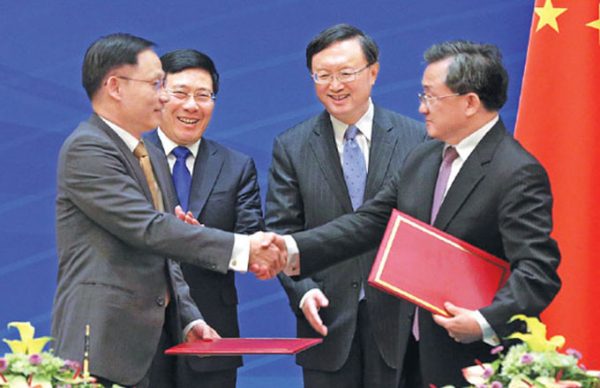
Nations will manage differences, plan for official visits by leaders
China and Vietnam on Monday vowed to push forward with the Belt and Road Initiative and maintain stability at sea.
State Councilor Yang Jiechi and Vietnamese Deputy Prime Minister and Foreign Minister Pham Binh Minh spoke during the 10th meeting of the China-Vietnam Steering Committee on Cooperation, which they led jointly. Minh is on a China visit from Sunday through Tuesday.
Yang asked both nations to take efforts to ensure successful visits of their leaders to each other’s countries this year.
In January, Nguyen Phu Trong, general secretary of the Communist Party of Vietnam Central Committee, paid a four-day official visit to China. The two sides had “a candid exchange of views” on maritime issues, according to a communique.
Yang said on Monday that Beijing and Hanoi should raise the quality and level of cooperation and forge a solid basis of public opinion for friendship.
The two leaders agreed to plan this year’s work, with “deepening high-level interaction” as the main focus.
They vowed to jointly push forward development of the Belt and Road Initiative, the two economic corridors linking China and Vietnam and the Beibu Bay economic zone, as well as cooperation in fields including investment, capacity, infrastructure and cross-border economic cooperation zones.
They also agreed to “properly manage and control differences and maintain maritime peace and stability”, according to a news release issued after the meeting.
Minh said his country attaches great importance to comprehensive and strategic cooperation with China.
The China-Vietnam Steering Committee on Cooperation was established in 2006. Its last meeting was in Hanoi in June.
Song Yinghui, an expert on Southeast Asia studies with the China Institutes of Contemporary International Relations, said relations between Beijing and Hanoi have improved since last year.
“Now, against the background of a gloomy global economy, China and Vietnam, as two fast-growing economies, have strong appeals for bilateral cooperation,” she said.
In the steel industry, for example, Vietnam needs China’s equipment and technique, Song said.
According to official Vietnamese figures, China has become the country’s largest exporter, with imports from China reaching $11.9 billion in the first quarter this year, an increase of 12.3 percent from a year earlier.


